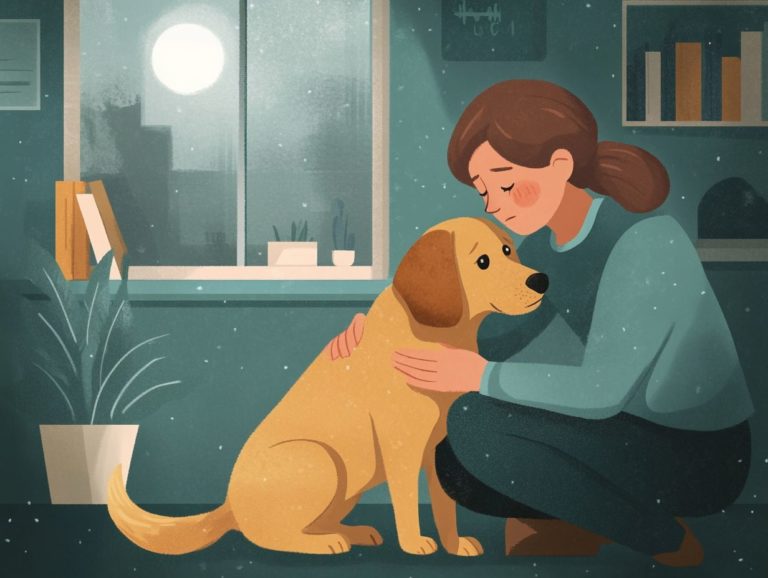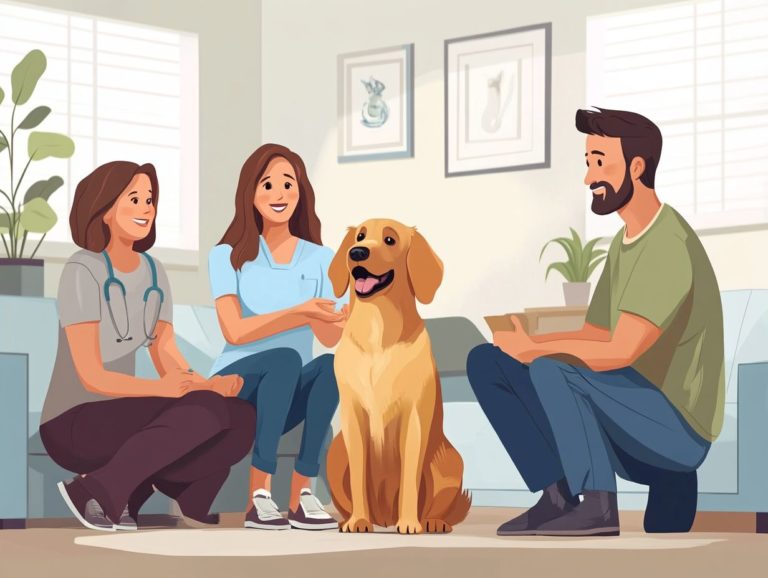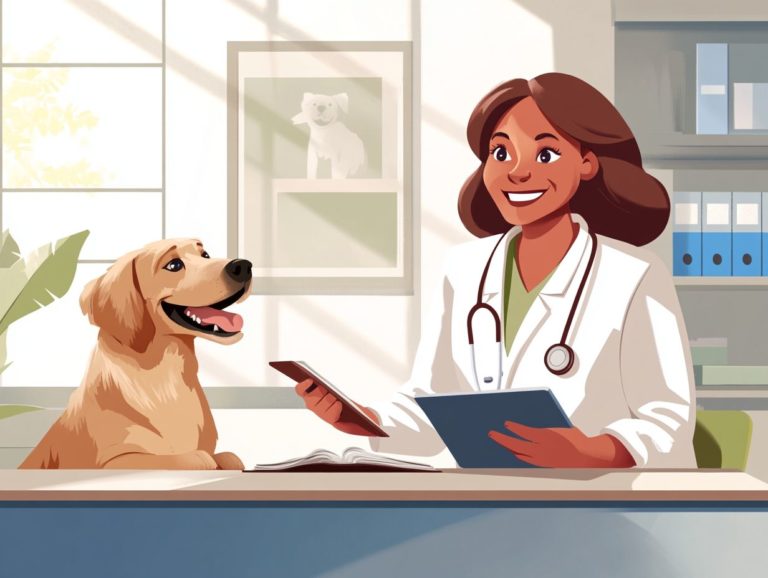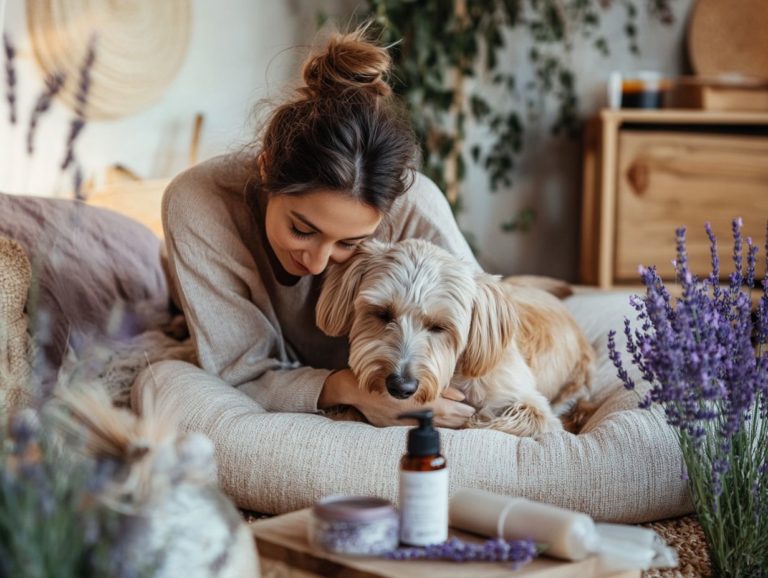Common Myths About Pet Anxiety Consultations
It’s crucial for pet owners to understand pet anxiety. Conditions like separation anxiety and isolation distress can impact your pet’s emotional health.
This article delves into the importance of seeking professional help, emphasizing the advantages of consultations specifically designed to address pet anxiety, particularly regarding clinical separation anxiety and behaviors such as vocalization and destructive behavior. You will find clarity as we debunk common myths surrounding these consultations, outline what you can expect during your visit, including discussions about behavior modification techniques and anxiety medications, and discuss follow-up care and treatment options available to you.
You will find practical tips for preventing and managing your pet’s anxiety, including creating a safe environment and incorporating physical and mental enrichment into their routines. Get ready to learn how to help your furry friends as they navigate their anxiety challenges, particularly those related to panic disorders and negative emotional responses.
Contents
Key Takeaways:
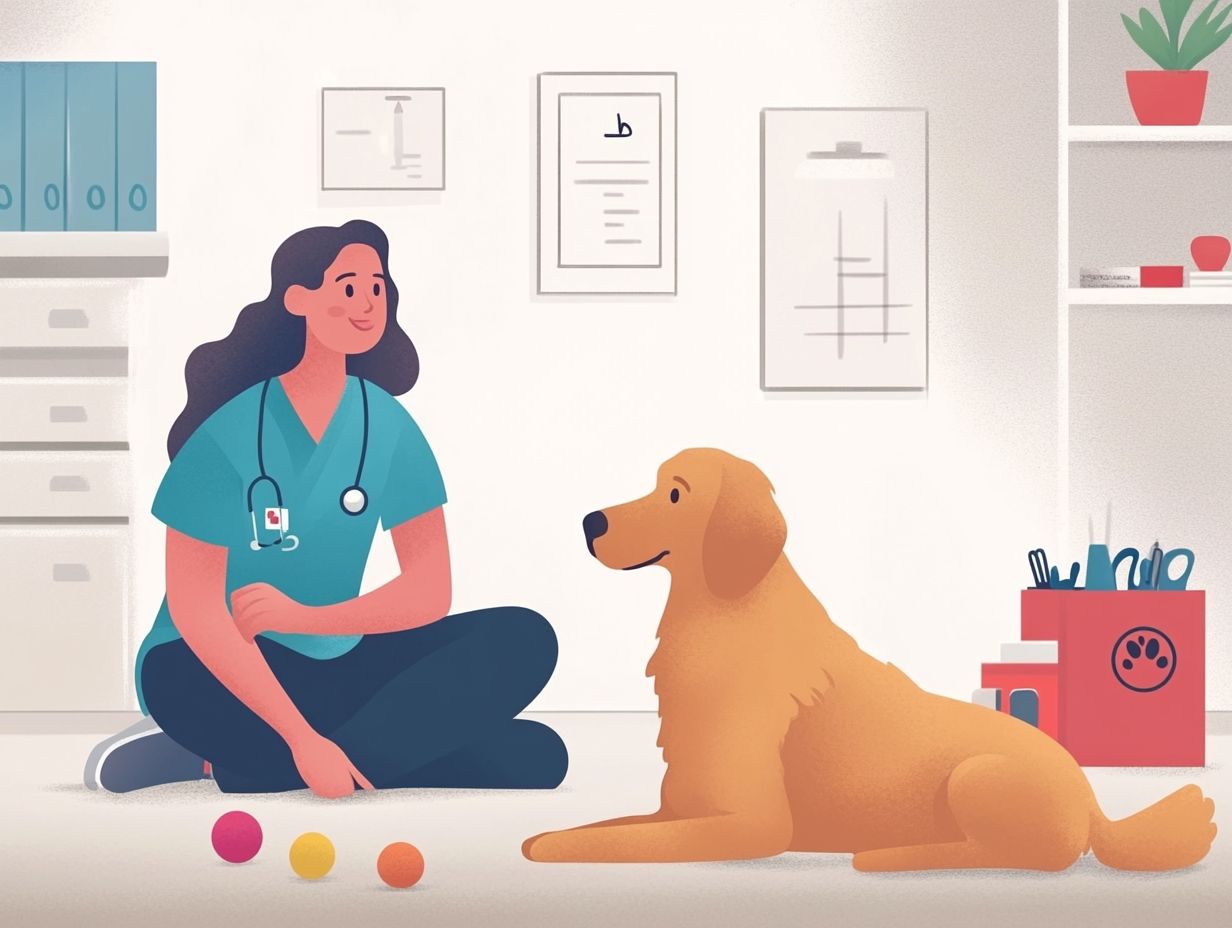
- Seeking professional help for your pet’s anxiety is important and beneficial, as it can improve their overall well-being and quality of life.
- There are many misconceptions about pet anxiety consultations, but they are an effective and evidence-based way to address your pet’s anxiety.
- Pet anxiety consultations involve a thorough process and utilize various techniques to help your pet, and there are also follow-up care and treatment options available for continued support.
Understanding Pet Anxiety
Pet anxiety can arise from a variety of sources, including inherited traits, traumatic events, early weaning, and changes in routine, such as the introduction of a second dog or the disruptions caused by rehoming events. These factors often lead to symptoms you might recognize, such as vocalization, destructive behavior, and elimination issues.
Confinement anxiety, in particular, occurs when pets feel trapped in enclosed spaces, causing significant distress, especially for dogs with a history of traumatic experiences or isolation distress. This type of anxiety may stem from negative past experiences, like being left alone in a kennel or during a long car ride.
For many dogs, separation-related behaviors can become apparent when they form an overly strong attachment to their owners. This attachment can lead to distressing signs like whining, pacing, or even house soiling whenever their humans are away. Recognizing these symptoms is critical, as they reveal deeper emotional struggles.
It’s important to address the underlying causes, such as inherited traits or negative associations, rather than simply managing the surface behaviors. For those considering a deeper understanding, knowing what to expect during a pet anxiety assessment can be crucial. Symptoms of pet anxiety include excessive vocalization, destructive behavior, and physical signs of distress, highlighting the need for effective management techniques.
Together, we can ensure our pets lead happy, anxiety-free lives. Let’s get started!
The Importance of Seeking Professional Help
Seeking professional help is essential when tackling pet anxiety. Engaging with experts like certified behaviorists, such as Karishma Warr or Melissa Dallier, and veterinary consultants allows you to access tailored behavior modification plans that cater specifically to your dog’s needs.
They can recommend anxiety medications and behavioral medications when necessary. This ensures your furry friend s well-being and happiness in managing their anxiety.
Benefits of Pet Anxiety Consultations
Pet anxiety consultations bring a wealth of benefits, from pinpointing the root causes of your dog’s anxiety, such as confinement anxiety and genetic predisposition, to crafting a personalized training plan that includes veterinary advice in managing pet anxiety.
This plan may involve systematic desensitization and exploring appropriate anxiety medications all aimed at enhancing your pet’s quality of life.
By participating in these consultations, you ll receive in-depth insights that illuminate the behavioral challenges at hand, including issues related to canine cognitive dysfunction. You will also gain tailored management techniques specifically designed for your unique situation.
This proactive approach cultivates a supportive community where you can share experiences, such as pet sitting and bonding activities, and seek advice. Remember, you are not alone on this journey!
Ongoing follow-up care is very important. It ensures that any new anxiety symptoms, such as isolation distress or vocalization, are swiftly addressed.
This allows for continual adjustments to your strategy and ultimately boosts your pet s emotional well-being.
Common Myths About Pet Anxiety Consultations
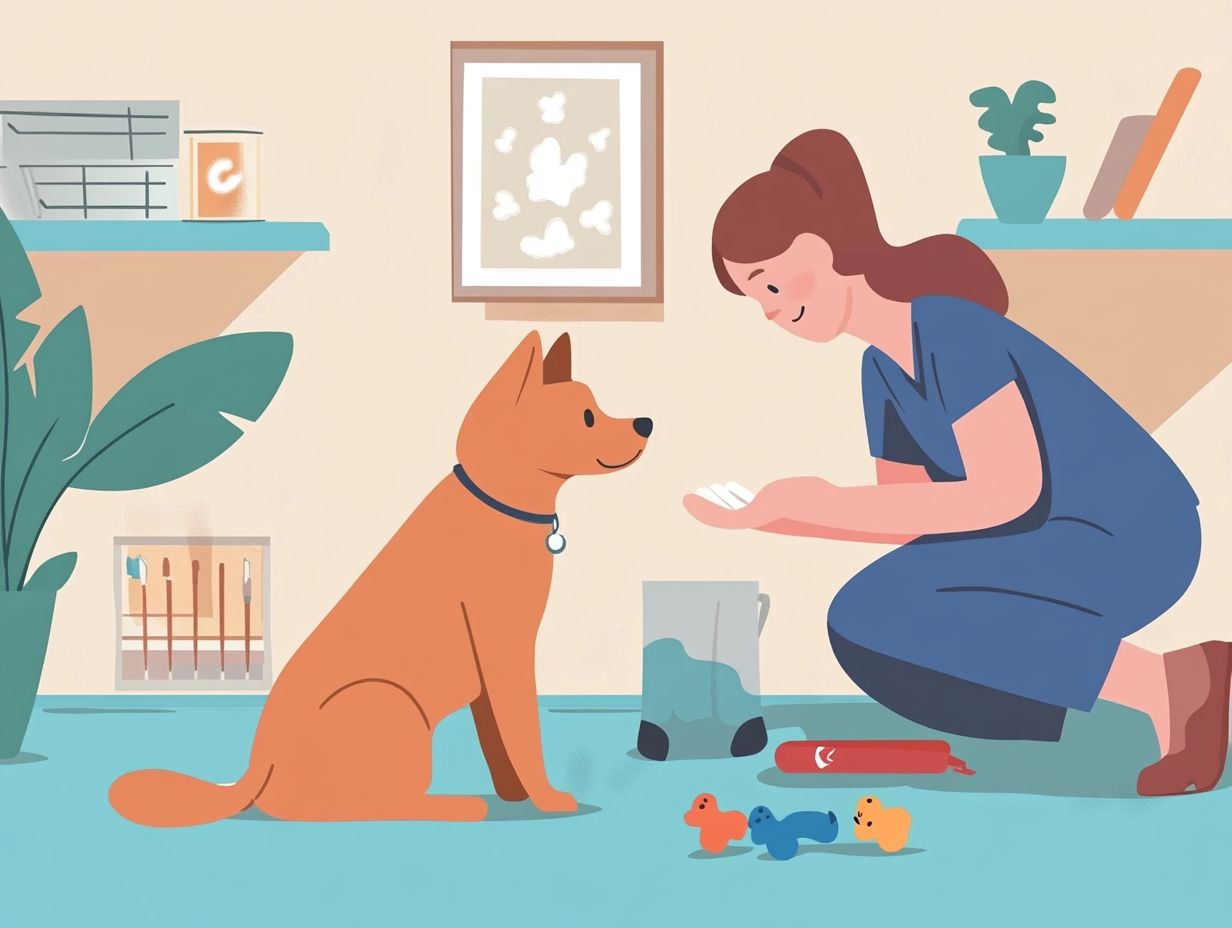
It’s common to hear misconceptions about pet anxiety consultations. Many believe these consultations are unnecessary or that seeking medication signifies a failure, but understanding what the myths about pet anxiety are can help clarify the importance of these services.
This overlooks the fact that behavioral medication can be a crucial component of successful crisis management for dogs facing severe anxiety. Such misunderstandings can hold you back from obtaining the essential help your anxious dog truly needs.
Debunking Misconceptions
Debunking misconceptions about pet anxiety is essential for you as a pet owner. This empowers you to make informed decisions, especially when considering how to handle consultation anxiety in pets.
Many believe that behavior modification alone can tackle complex issues, such as panic disorders and confinement anxiety. They may overlook the need for professional help or think that anxiety medication is inherently harmful.
In reality, the challenges of pet anxiety often require a more nuanced approach. Issues like genetic predisposition or traumatic events can complicate matters, and knowing when to consult a professional for pet anxiety can make a significant difference.
It s common for owners to hesitate in seeking professional guidance, fearing that medication might alter their pet s personality. They may also worry that they ll become overly reliant on pills rather than exploring holistic solutions like food toys or positive reinforcement training.
This hesitation can create a cycle of distress for both you and your pet. Unresolved anxiety can escalate into more serious behavioral problems, such as canine cognitive dysfunction or destructive behaviors.
By fostering a partnership between behavioral therapy and veterinary guidance, you can develop a comprehensive treatment plan. This plan will not only address immediate concerns but also promote long-term well-being and stability for your beloved companion.
What to Expect During a Pet Anxiety Consultation
During a pet anxiety consultation, you can anticipate a comprehensive evaluation of your dog’s anxiety symptoms. This includes assessments for separation anxiety and strategies for crisis management, as outlined in the benefits of online consultations for pet anxiety.
This assessment will guide the creation of a tailored management plan. It will incorporate behavior modification strategies and recommendations for anxiety medication, expertly delivered by seasoned dog trainers or certified behaviorists.
Take the first step today to help your dog feel more secure and happy!
Your Journey to a Calmer Pet Starts Here!
During a pet anxiety consultation, you can expect a thoughtful process that often incorporates step-by-step exposure methods and gradual desensitization strategies. For a deeper insight, consider exploring different types of pet anxiety experts, as these are essential for helping your dog cope with anxiety-provoking situations.
These methods aim to gradually expose your dog to anxiety-provoking situations, such as loud noises or being left alone. We also integrate behavior modification strategies and, if necessary, medications that help calm your pet to facilitate progress.
The goal is to create a structured environment that may include elements like a safe space or comfort items. This is where your dog feels secure as they face their fears step by step.
By breaking the exposure down into manageable increments, trainers work to reduce your pet’s reactivity and foster confidence over time. We reinforce positive behaviors through effective management techniques.
In certain instances, behavioral medication might be essential for more severe cases, offering vital support. This ensures your dog can fully engage with the training plan and ultimately experience lasting improvements.
Follow-Up Care and Treatment Options
Follow-up care and treatment options are crucial in managing your pet’s anxiety. This includes veterinary consultations and adjustments to anxiety medications.
These consultations allow for adjustments to behavior modification plans, ensuring that your pet receives the best care possible. This ongoing attention helps both you and your dog feel more at ease.
Continuing Support for Your Pet’s Anxiety
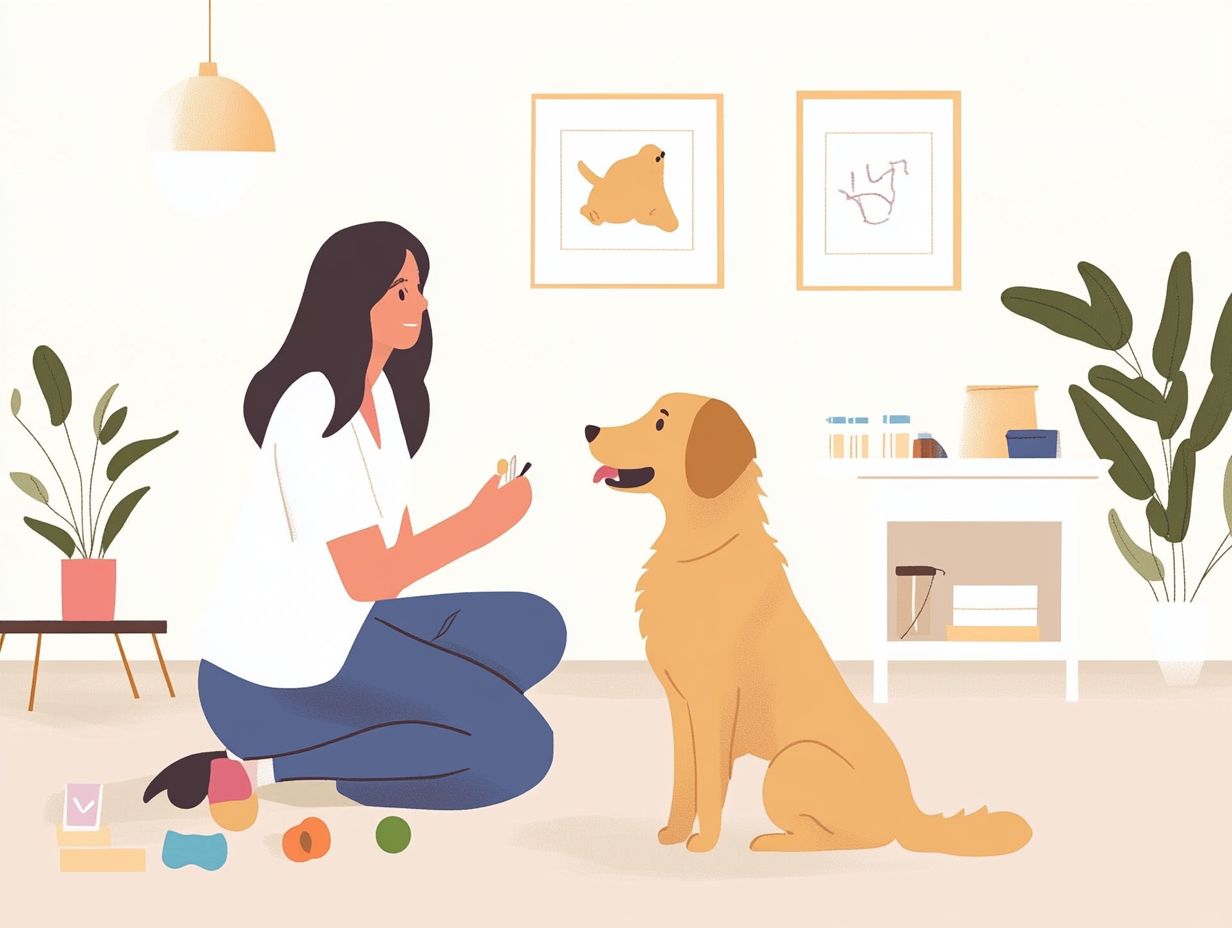
Continuing support for your pet’s anxiety is crucial for maintaining progress. Regular veterinary consultations help you adjust anxiety medication and management techniques, ensuring your dog receives the best care possible on their road to recovery.
In addition to these check-ins, consider the ongoing need for modifications to training plans and anxiety treatments. Tailoring these specifically to your furry companion’s evolving needs is essential.
This proactive approach enables you as a pet owner to identify triggers and fine-tune coping strategies. Long-term management of anxiety requires patience, consistency, and a commitment to monitoring behavioral changes.
Being aware of potential triggers that can exacerbate anxiety symptoms is vital. This dedication can significantly enhance both your pet’s quality of life and the bond you share, fostering a deeper connection and understanding of your dog’s needs.
By actively participating in this journey, you can foster a sense of security and stability that is vital for your beloved pet.
Preventing and Managing Pet Anxiety
Act now to create a safe environment and start working toward a happier, healthier pet! Preventing and managing pet anxiety requires a thoughtful blend of effective strategies.
This includes creating special areas in your home where your dog feels safe and providing mental enrichment through training and interactive play. By creating a safe environment, offering both physical and mental enrichment through engaging activities like food toys, and ensuring your dog gets regular exercise, you can significantly diminish the chances of anxiety disorders taking root.
These proactive measures not only promote well-being but also foster a deeper bond between you and your furry companion. This enhances your mutual trust and emotional attachment.
Tips for Reducing Anxiety in Pets
To effectively reduce anxiety in your pets, consider implementing a range of strategies, including regular exercise, teaching your pet to feel safe in a designated space for comfort, and providing both physical and mental enrichment through engaging toys and activities. These approaches work together to create a balanced and calm environment for your dog.
By ensuring that your dog receives ample exercise, you not only enhance their physical health but also help release pent-up energy that can lead to anxiety. Engaging in daily walks or play sessions can elevate their mood and significantly reduce stress levels.
Crate training provides a comforting space for your pet, allowing them to feel secure when they need a respite from stimulating surroundings.
Incorporating puzzle toys or training exercises can mentally engage your dog, effectively distracting them from anxiety triggers while fostering a sense of accomplishment. Each of these methods contributes to a more relaxed demeanor and better overall well-being for your beloved companion.
Frequently Asked Questions
Are pet anxiety consultations only for extreme cases?
No, pet anxiety consultations can help with a wide range of anxiety levels in pets. Understanding the role of family in pet anxiety consultations is crucial, as it’s always better to address any signs of anxiety as soon as possible to prevent them from becoming more severe.
Do all pets experience anxiety?
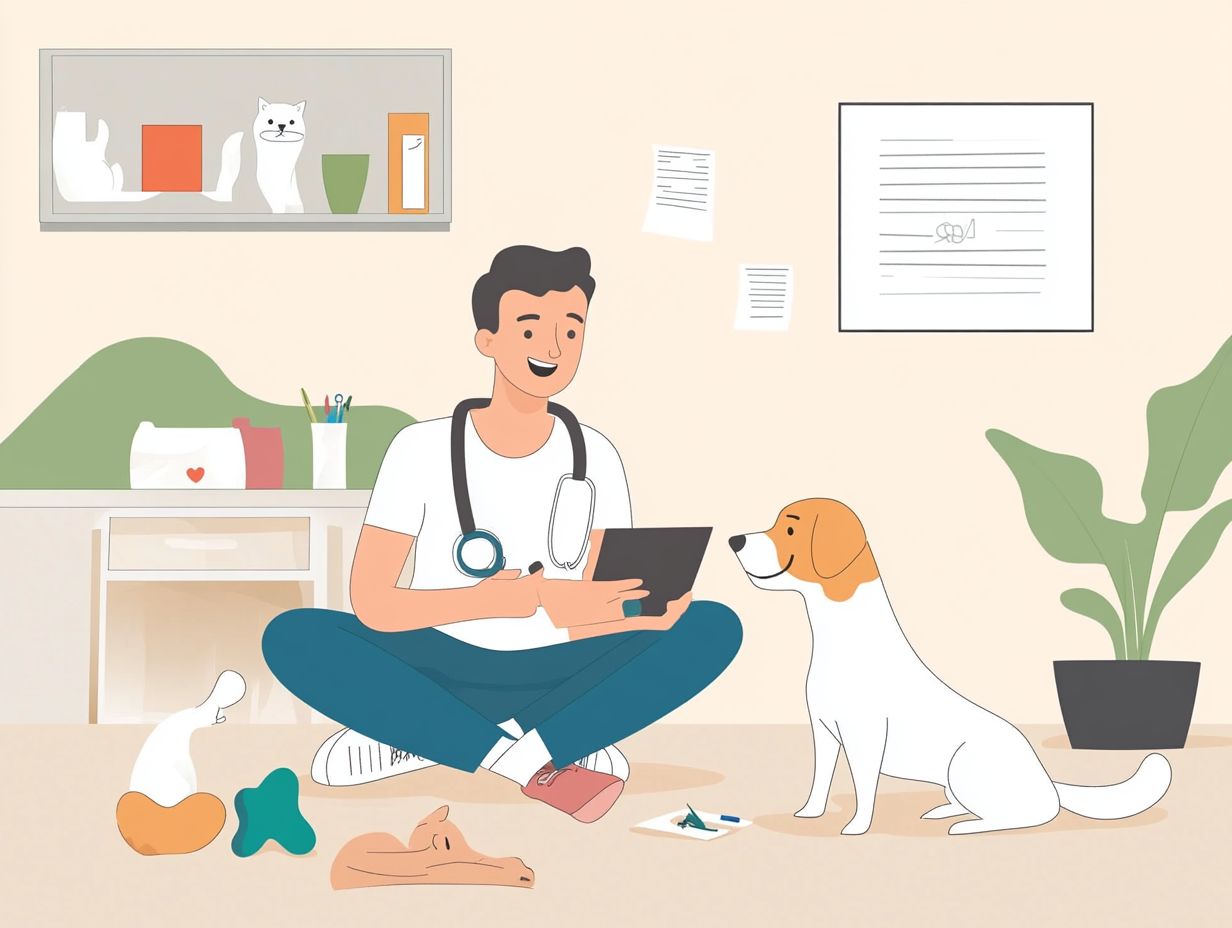
Just like humans, each pet is unique and may experience anxiety differently. While some pets may never show signs of anxiety, others often experience it at some point in their lives.
Can pet anxiety be cured?
While there is no universal “cure” for pet anxiety, there are many effective treatments and management techniques available, including anxiety medication. With the right approach, including behavior modification which means changing your pet’s behavior through consistent training and systematic desensitization, pet anxiety can be significantly reduced or managed. Consulting a certified behaviorist or a dog trainer can also be beneficial in creating a tailored training plan for your pet.
Is pet anxiety just a behavioral issue?
No, pet anxiety can have medical causes such as underlying health conditions or imbalances in brain chemicals. Consult your veterinarian to uncover the cause of your pet’s anxiety!
Will my pet have to take medication for their anxiety?
Medication may be recommended in severe cases of pet anxiety, but it is not always necessary. Other treatment options, such as behavior modification techniques and natural supplements, can also be effective in managing pet anxiety.
Is pet anxiety consultations a waste of money?
No, investing in pet anxiety consultations can greatly improve your pet’s quality of life and prevent potential behavior or health issues. To make the most of these consultations, consider reviewing the top questions to ask your pet anxiety specialist. It is a valuable investment in your pet’s well-being and overall happiness.



